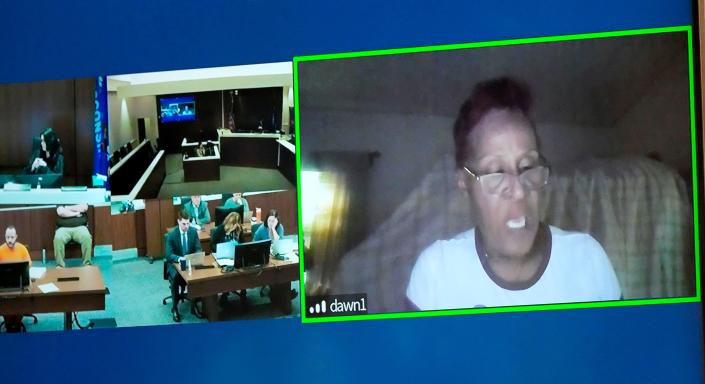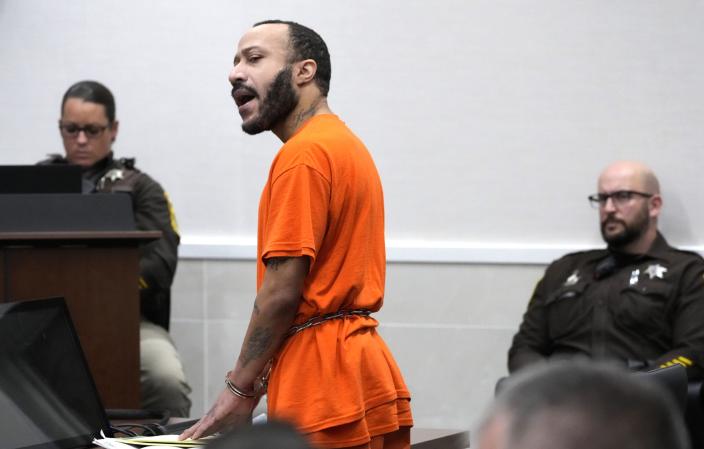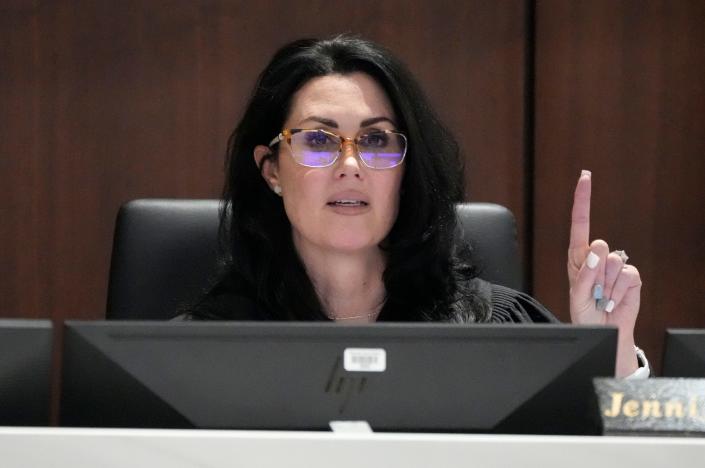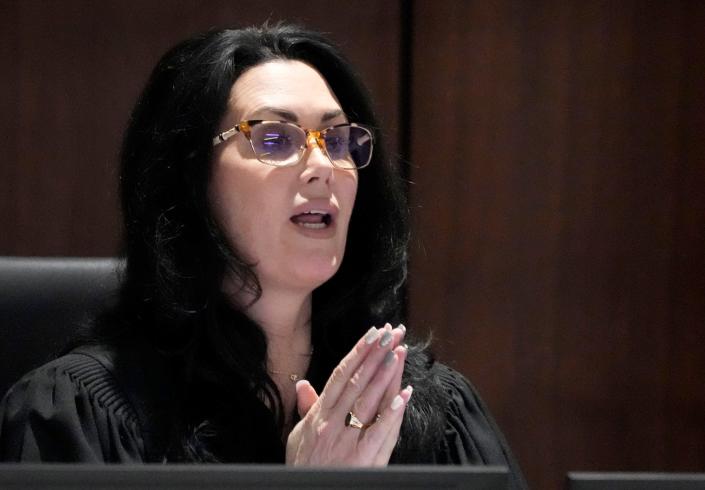WAUKESHA – Darrell Brooks will spend life in prison six times over for the death and injuries he caused in the 2021 Waukesha Christmas Parade attack.
Waukesha County Circuit Court Judge Jennifer Dorow on Wednesday formally sentenced Brooks to consecutive life sentences for first-degree intentional homicide, with no chance of parole, in the deaths of Tamara Durand, William Hospel, Jane Kulich, Leanna Owen, Virginia Sorenson and Jackson Sparks.
She also sentenced Brooks to 17 1/2 years for each of the 61 counts of first-degree recklessly endangering safety, or a total of 762 years of initial confinement and 305 years of extended supervision; and 25 years each for the six hit-and-run counts running concurrent to the reckless endangerment charges.
In all, beyond his life sentences, he was sentenced to more than 1,200 years, including extended supervision.
For each life sentence given for the six deceased victims, the gallery, mainly consisting of victims of the tragedy, erupted into applause. While Dorow allowed the applause for those who died in the attack, she asked that they remain quiet for the rest of the sentencing. Despite the gallery’s applause, their faces remained somber, many sniffing back tears.
One day after loved ones and victims of the Waukesha Christmas Parade tragedy presented impact statements ahead of the sentencing of Brooks, Brooks himself spoke for more than two hours ahead of what was expected to be a life sentence.
More than 40 victims and family members of victims either took to the stand or submitted written statements, almost all directly addressing Brooks angrily and bluntly. Most also asked Waukesha County Circuit Judge Jennifer Dorow to ensure Brooks would live out his life in prison, with some wishing him only pain for the lives he took or shattered.
Six people died and at least another 61 others were injured when a red Ford Escape SUV driven by Brooks tore through the holiday parade on Nov. 21, 2021. The attack left in its wake what police called a “chaotic” atmosphere as authorities and others scrambled to help victims over a four-block stretch.
Brooks, 40, of Milwaukee was convicted on Oct. 26 on all 76 criminal charges he faced in the parade attack trial: six counts of first-degree intentional homicide, 61 counts of recklessly endangering safety, six counts of hit-and-run causing death, two counts of bail jumping and one misdemeanor count of battery.
Brooks’ 18-day trial represented the end of a long legal process that included dramatic shifts, beginning with charges filed two days after the parade and continuing with pretrial hearings just days before the trial began. The trial was replete with disruptions and delays from Brooks, who decided just days before the proceedings began that he would represent himself.
More:For shop owners along Waukesha parade route, Darrell Brooks verdict never in doubt.

Brooks’ mother Dawn Woods and his grandmother Mary Edwards says he suffers from mental illness and should be treated for it
Prior to sentencing, several relatives and friends, including Brooks’ mother Dawn Woods, spoke on Brooks’ behalf.
Speaking remotely via Zoom, Woods called her son “broken,” not an uncaring person, despite his courtroom actions and the charges he faced.
“Mental illness affects everyone. It destroys lives and affects family,” Woods said. “It is of no fault of their own that they are ill, and began to change as a person.”
She acknowledged that people who act maliciously out of mental illness should be held accountable, but through medication, therapy and special institutions. Woods said people need to show empathy and compassion in that regard.
“I have been dealing with mental illness for some 30-odd years now, and here’s my take on it,” Woods said. “Jail is not the answer.”

Mary Edwards, Brooks’ grandmother, said she asked to speak for two reasons: to apologize to those hurt by Brooks’ actions in the parade, particularly the family of Jackson Sparks, and to ask for forgiveness.
“Darrell has lost his mind and his life in the outside world,” Edwards said, and explained Brooks has suffered from bi-polar disorder for many years.
Michele Alworth, a close friend who remembered better times with Brooks, said she suffers from medical problems, and Brooks assisted her with her needs, including in emergency situations. She saw a different person that the man convicted by jurors.
Saying Brooks had a manic episode that he has blocked out of his memory, Alworth said she hopes “he gets the help he needs for his mental illness” in a qualified institution.
Darrell Brooks speaks for nearly two hours about his struggles and beliefs
In tears since his mother’s comments, Brooks spoke softly and slowly when given the chance to speak on his own behalf, choosing to address victim statements and his own infamy.
In a rambling nearly two-hour statement, his focus at first remained on victims’ comments from Tuesday, including things “I have struggled with myself.”
The gallery, mainly consisting of those impacted by the tragedy, was at capacity, and a group formed outside the courtroom’s doors. After an hour passed of Brooks’ statement, they began to whisper to each other, wondering how long he would be allowed to continue.
Reaffirming his Christian beliefs, and occasionally quoting from the Bible, he said he wanted to clarify what he meant in closing statements when he said his “conscience was clear.” He wanted people to know he was repentant.
“I made a decision to rededicate myself to Christ when this tragedy happened,” Brooks said. “I have repented, that I have asked God for forgiveness.”

Brooks also said he wasn’t trying to “hide” the person he is and from what happened.
“I want everyone to know, including the community of Waukesha, not only am I sorry for what happened, but that you could not see what was truly in my heart … and all the tears that I dropped,” he said.
But, he added: “It’s not me who can take any pain away, replace what is lost and bring back joy. I think all that comes with belief in Christ, and all that comes with time. It’s a process that we all have to go through.”
His frustration in not being able to defend himself caused him to act out in court, Brooks said, adding that he has struggled throughout his life with various issues, including physical abuse “by the people that are supposed to love you,” and “trying to understand why your mind works like the way it does.”
Flashes of his anger, seen often during the trial and in hearings immediately preceding it, returned as he raised his voice to say the parade incident “was not, not, not an attack. … This was not an intentional act.”
Addressing prosecutors, particularly Waukesha County District Attorney Sue Opper, Brooks said he wanted to take the “high road” while expressing his frustrations about some of their statements. “It’s not easy being the most hated man on this planet,” he said, adding later, “I’m a human being, not a monster.”

Dorow twice asked Brooks after long intervals if he wished to comment on his sentencing following his conviction.
Pressed for an answer, Brooks said he wanted to be sentenced somewhere he could be medicated to remove the “pain” he continues to struggle with mentally, and “to not be put in a place to just be forgotten about.”
Brooks’ attempts to prove that his actions were unintentional were met with disgusted grimaces from the gallery, many releasing stifled laughter.
Judge Jennifer Dorow refutes mental illness claims and more in sentencing
Next, it was Dorow’s turn to address the case as a preamble to sentencing.
Because of the nature of the comments Wednesday, she began with the claims by Brooks and his family about mental illness as the root cause of the parade incident.
Noting that Brooks had at one point pleaded not guilty by reason of mental defect, which he ultimately withdrew, Dorow said she has read through four reports from medical psychology experts about his mental state that were initially prepared because his insanity plea.

For the first time, she confirmed none of those reports supported that special plea.
“I don’t want there to be any doubt that this trial was missing something,” Dorow said, noting that one report was 24 pages that examined a variety of records, including mental health documents. “I have absolutely no doubt that Mr. Brooks is competent. That was something I was not worried about at any time during this trial.”
Many in the gallery vehemently nodded in agreement.
Dorow noted that his previous mental health reports indicated an anti-social personality disorder, not a state of mental illness that would have contributed to the parade incident. Quoting from one report, she noted that a doctor had noted “his lack of remorse” and lack of respect “for the rights of others.”
“There is no medication for people who do evil,” Dorow said, adding that Brooks clearly understands right and wrong but “is fueled by his rage. … The bottom line is that none of that caused you to do what you did on Nov. 21, 2021.”
Dorow also addressed the particulars of the parade incident, based in part on evidence included in numerous exhibits, starting with the Frame Park incident with his ex-girlfriend that fired his anger.
That anger became evident when Brooks began shouting at Dorow during her findings as part of sentencing, yelling over her when she tried to address Brooks’ violent relationship involving his ex-girlfriend, who he continued to discredit. (He was removed to a neighboring courtroom as a result.)

Dorow, among other points, noted his decision not to use safe escape routes to avoid injuries to parade participants at anytime. But as she spoke, reviewing video evidence, Dorow herself broke into tears as revisited the severe injuries to children in and around the parade.
“These are just some of the highlights, I should call them lowlights, about what people testified,” she said, with one piece of evidence coming to mind: “When Jane Kulich was on (Brooks’) vehicle, and then he braked to get her off that vehicle, to run her over again.”
Dorow also shot back on Brooks’ repeated statements about not understanding the criminal proceedings, part of his sovereign citizen defense. She called his approach before and during the trial “sophisticated” and “nuanced,” showing not only his competency but his deep knowledge of the law.
The impact on the city of Waukesha, as spelled out by those victims who spoke Tuesday, was also part of Dorow’s presentencing statements. At times, she spoke directly to victims in the gallery, including the Xtreme Dance Team and Waukesha South marching band member and victim Tyler Pudleiner and his mother, Katti Pudleiner, calling him a “phoenix” rising from the ashes.
“Clearly, you have a phoenix for a son,” Dorow said.
The Pudleiners nodded gratefully, Katti and wiping away tears. Xtreme Dance Team members cried when Dorow thanked Alyssa Gajewski, their coach, for her emotional testimony.
“What did this community suffer as a result of this tragedy?” Dorow asked. “I think Lori Lochen said it best: ‘The loss of a sense of personal safety.'”
As she reviewed the victim statements by the Sparks family, Dorow again was moved to tears. “It was difficult to even watch them make their statements,” she said, her voice again breaking.
She referenced Tucker Sparks’, brother of deceased victim Jackson Sparks, victims’ guilt that his mother mentioned in yesterday’s statement. “It’s not your fault, Tucker,” Dorow said. “It’s Mr. Brooks’ fault.”
Victims in the courtroom comforted each other, rubbing each other’s backs and resting their heads on each other’s shoulders.

Judge Jennifer Dorow waited for ‘a true apology’ from Brooks to the victims and never got it
Stating that her sentencing decisions “are not about Mr. Brooks’ conduct during this trial,” Dorow said her focus was his actions on Nov. 21, 2021, “moments that are tragic, moments that were frankly avoidable” and his attempts to flee after striking close to 70 people.
With Brooks again removed from the courtroom, again for arguing with her when she tried to begin the sentencing phase, she said her sentencing was intended to bring closure to victims, especially in view of the loss of life and “its reach into the community.”
While the gallery quietly scoffed at Brooks’ repeated attempts to reenter the courtroom, despite her request that he pledge to halt his interruptions, the atmosphere remained serious in anticipation for Dorow’s sentencing.
“The seriousness of this offense can be summed up in one word: attack,” Dorow said, focusing on what was supposed to be a holiday parade turning into a scene of carnage. “He chose to drive recklessly, maliciously and viciously” into the crowd,” she added.
Dorow said she was influenced by “the complete disregard for the lives of anyone else” which one victim “described as depraved indifference, she noted that Brooks showed no remorse as victims spoke Tuesday.
“We may never know the true why, but we were provided by nothing today, other than a feeble attempt to claim mental health,” she said. “I searched for a mitigating factor. I waited for a true apology. I didn’t get it.”
“This is one of the most aggravating cases I have ever presided over,” Dorow said.
Dorow also dove into the conversations with his ex-girlfriend and mother of one of his children, showing his “rage and anger” that spilled over into the Christmas parade, and demonstrated his “poor moral character.”
She also cited his violent past and criminal record in her decision, based on standards of punishment, protecting the community and bringing closure to victims.
“There will be none of the milestones these families are looking for. Frankly, Mr. Brooks, no one is safe from you,” Dorow said.
Contact Jim Riccioli at (262) 446-6635 or james.riccioli@jrn.com. Follow him on Twitter at @jariccioli.
Our subscribers make this reporting possible. Please consider supporting local journalism by subscribing to the Journal Sentinel at jsonline.com/deal.
DOWNLOAD THE APP: Get the latest news, sports and more
This article originally appeared on Milwaukee Journal Sentinel: Darrell Brooks sentenced to life in prison in Waukesha parade attack
